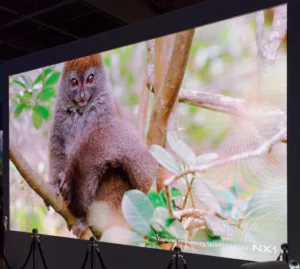Samsung was at the event highlighting the advantages of the SoC technology in its interactive products. The company has had only limited success in the education market (our comment!) in the UK and has recently appointed Midwich in the UK as an exclusive distributor. Exclusivity is important, Samsung told us, because most sales of interactive displays in education need a lot of work, usually including demonstrations, so it makes more sense to have an exclusive distribution so that the channel can afford to invest.
Samsung has a dedicated Education App Store which limits the number of apps, compared to using the Google Play store, but means that apps can be quality controlled and curriculum-based. Samsung also works with RM and supports the RM EasiTeach software. The firm is also working with Kortext on digital text books which can be made available for courses. Samsung supports the Kortex App in its displays.
Samsung mainly uses infrared touch in the education market, but has been developing its PCap touch technology which is now available up to 65″.
We also talked to the company about its LED products and business development as it was showing a big display at the event. Initially, many of the LEDs (the ones not made by Yesco) were being made in Suwon, Korea, but now the LED work is being done (in a Samsung factory, we were told) in China, with module assembly in Eastern Europe. This has reduced delivery times to eight weeks or so, which has removed a significant barrier to sales.

